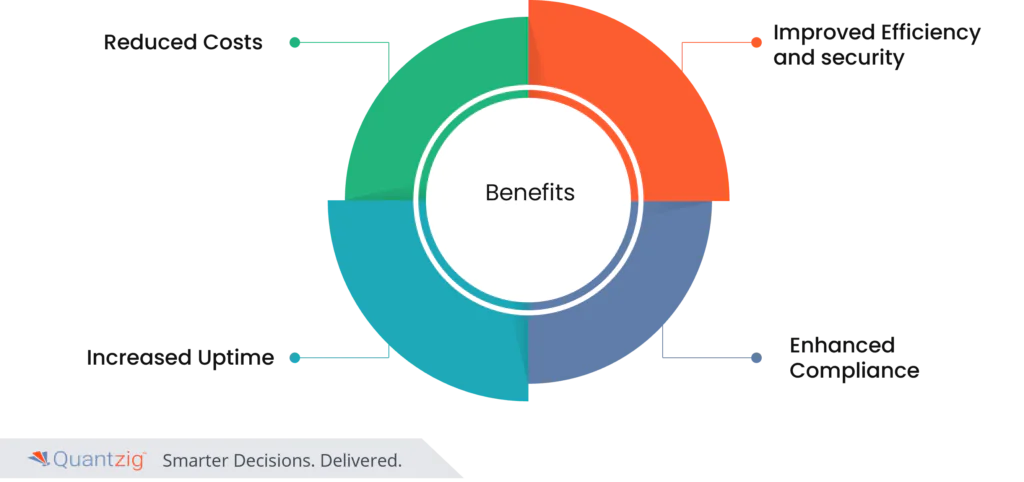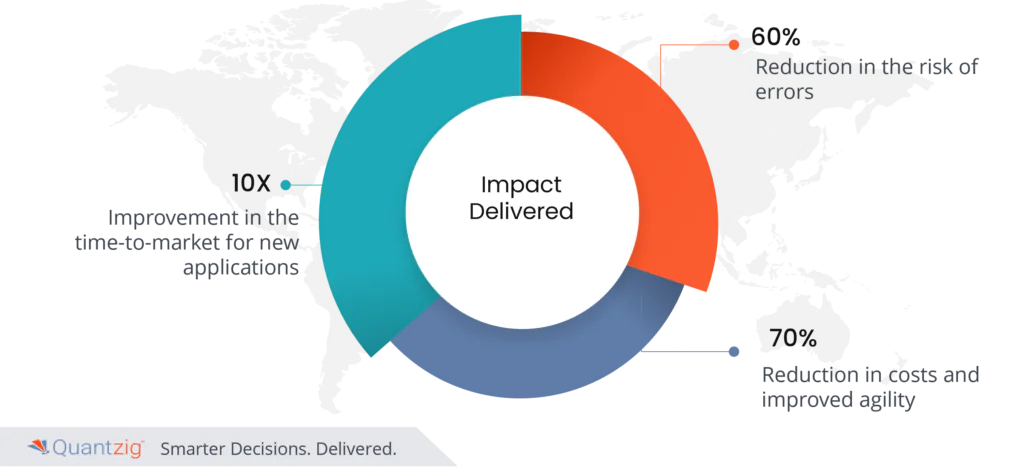Table of Contents
Evolving Trends in Application Managed Services (AMS)
As businesses scale, managing complex IT infrastructures, cloud applications, and enterprise software becomes increasingly challenging. To streamline operations and enhance efficiency, many organizations are turning to third-party Application Managed Services (AMS) providers. These experts offer specialized support, ensuring seamless software performance, security, and compliance while aligning IT strategies with business goals.
This article explores the top AMS trends shaping IT management, from AI-driven automation to enhanced security measures. With AMS providers handling everything from software maintenance to regulatory compliance, businesses can focus on innovation and growth in an ever-evolving digital landscape.
Book a demo to experience the meaningful insights we derive from data through our application management tools and platform capabilities. Schedule a demo today!
Request a DemoThe Importance of Application Management Services (AMS)
The IT landscape is evolving rapidly, with new technologies reshaping how businesses deploy, manage, and optimize applications. Organizations must leverage Application Management Services (AMS) to maintain competitiveness, enhance security, and streamline operations. AMS providers play a critical role in integrating emerging technologies such as AI, automation, and cloud computing while ensuring security and compliance. Below, we explore key AMS trends and their impact on enterprise IT management.
Key AMS Trends and Business Impact
| Trend | Description | Business Impact |
|---|---|---|
| Cloud-Native Application Management | AMS providers leverage cloud-native technologies for scalability, agility, and cost-efficiency. | – Streamlines business operations – Reduces infrastructure costs – Enhances flexibility and responsiveness – Ensures seamless scaling |
| DevOps and Agile Methodologies | The integration of DevOps and Agile practices automates workflows, improves collaboration, and accelerates software delivery. | – Reduces time-to-market by 10x – Minimizes system errors by 60% – Enhances operational efficiency and innovation |
| Artificial Intelligence and Machine Learning | AI and ML drive predictive maintenance, intelligent automation, and performance optimization. | – Reduces operational costs by up to 60% – Prevents system outages through predictive insights – Improves user experience and reliability |
| Security and Compliance Management | AMS providers implement advanced security measures and ensure compliance with industry regulations. | – Strengthens cybersecurity defenses – Ensures regulatory adherence – Reduces risks of fines and data security breaches |
| Serverless Computing Adoption | AMS providers integrate serverless computing, enabling businesses to run applications without managing servers. | – Cuts IT costs significantly – Enhances agility by up to 70% – Frees up resources for innovation and core business activities |
Experience the advantages firsthand by testing a customized complimentary pilot designed to address your specific requirements. Pilot studies are non-committal in nature.
Request a pilotHow AMS Providers Drive IT Optimization
AMS providers offer comprehensive services that extend beyond traditional IT support, ensuring proactive management and continuous optimization of enterprise applications. Key areas of impact include:
- Proactive IT Operations: Continuous monitoring and performance optimization to prevent downtime.
- Comprehensive IT Support: Managing CRM systems, BI analytics,
database management and infrastructure. - Regulatory Compliance & Security: Implementing advanced security measures to meet industry-specific requirements.
- Application Enhancements & Upgrades: Streamlining software updates, patch management, and system optimizations.
Why Businesses Should Invest in AMS?
Investing in AMS enables organizations to streamline IT operations, strengthen security, and accelerate innovation. By leveraging automation, AMS minimizes manual intervention, enhancing operational efficiency. Robust security frameworks protect against cyber threats and ensure compliance, reducing risks. Cost optimization is another key advantage, as AMS helps lower operational expenses while maximizing IT performance. Additionally, businesses can focus on strategic growth initiatives instead of IT maintenance, fostering long-term innovation and competitiveness.
Benefits Of Implementing This Service:
AMS offers businesses a strategic advantage by providing access to specialized expertise and scalable solutions. Small businesses benefit from AMS by eliminating the need for extensive in-house IT teams, allowing them to focus on core operations and growth. Meanwhile, large enterprises gain flexibility in handling fluctuating service demands, optimizing resource allocation, and ensuring seamless business alignment.
Additionally, AMS streamlines the management of critical systems such as Content Management Systems (CMS) and consumer app marketplaces, improving visibility and control over marketing efforts and compliance-driven industries. By leveraging AMS, businesses enhance operational efficiency, reduce costs, and position themselves for sustained success in a dynamic digital landscape.

| Benefit | Description |
| Reduced Costs | Lowers expenses related to hiring, training, hardware, software, and downtime. |
| Improved Efficiency | Enhances application deployment, updates, and incident resolution. |
| Increased Uptime | 24/7 monitoring ensures minimal downtime and business continuity. |
| Improved Security | Implements strong security measures, regular audits, and threat mitigation. |
| Enhanced Compliance | Ensures adherence to industry regulations, reducing risks and penalties. |
The implementation of AMS not only alleviates the financial burden of service application management but also significantly enhances operational efficiency, application availability, security, and regulatory compliance. By entrusting these critical aspects to specialized AMS providers, organizations can focus on their core competencies, drive innovation, and remain competitive in an ever-evolving digital landscape.
Experience the advantages firsthand by testing a customized complimentary pilot designed to address your specific requirements. Pilot studies are non-committal in nature.
Request a pilotTop Trends
1. Enterprise-level Expertise:
Leading AMS providers, such as Deloitte member firms, bring a wealth of worldwide infrastructure and technology talent to the table. This expertise is crucial in navigating the complexities of the IT landscape, ensuring that enterprises can optimize their existing technology and achieve cost reductions.
2. Continuous IT Improvement:
The dynamic nature of technology requires a constant focus on continuous improvement. AMS providers employ best practice processes and methodologies, such as the Support Value Delivery Methodology, to drive optimized operations and business results. This approach enables enterprises to stay ahead in the technology lifecycle and build a sustainable competitive advantage.
3. Application Management Strategy:
AMS providers play a pivotal role in developing and implementing an effective strategy. This involves systems integration, information management, and outsourcing non-core functions. The managed service advisory function guides enterprises towards their target state, aligning IT dollars with business innovation.
How To Choose an AMS Provider:
Selecting the appropriate AMS provider stands as a pivotal decision directly influencing the triumph of your enterprise. Delve into considerations such as the provider’s tenure in the IT marketplace, their revenue from enterprise application outsourcing, and their dedication to continual IT enhancement. Scrutinize their capacity to harmonize with your business objectives and furnish a flexible framework customized to your requisites.
For instance, organizations must assess the prospective AMS provider’s adeptness in managing IT operations encompassing software systems and cloud applications. It’s imperative to gauge their proficiency in addressing bugs and providing support services while also evaluating their commitment to customer service excellence. Furthermore, delve into their capability in maintaining and optimizing CRM systems and Business Intelligence (BI) platforms.
An exemplary AMS provider should boast a skilled workforce comprising database analysts, SQL programmers, and software developers, ensuring comprehensive coverage for your IT needs. Organizations may find resonance with esteemed providers like Resolute Technology Solutions, renowned for their prowess in delivering tailored IT solutions to enterprise-level companies.
By conducting a thorough evaluation encompassing these facets, enterprises can make an informed decision, securing an AMS partner primed to propel their business towards sustained success.
Why Choose Quantzig:
Quantzig stands out as a premier AMS provider, offering a comprehensive suite of technology solutions. With a focus on delivering sustainable value, Quantzig excels in managing the application lifecycle, providing a single-vendor solution for enterprises. Their approach involves a build-to-operate model, ensuring that your organization benefits from optimized operations and reduced complexity.
How Telecom Marketing Mix Strategies Benefit:
For telecom enterprises navigating the competitive landscape, implementing effective marketing mix strategies is crucial. AMS providers, such as Quantzig, contribute significantly to telecom marketing success by ensuring application performance, reducing costs through a fixed-fee package, and enabling seamless integration with ERP software. The expertise provided by AMS enhances the overall telecom marketing mix, allowing companies to focus on their core competencies.
Success Story
Client Details:
A leading chemical manufacturing company located in the US.
Challenges
A significant challenge faced by a large chemical manufacturer was the imperative need to develop a cloud-native application. The primary purpose was to efficiently catalog their extensive data resources, thereby enabling swift and seamless referencing for their application development endeavors.
Solutions
Quantzig, an enterprise-level company, successfully delivered an end-to-end solution for one-click data cataloging using Microsoft Power platforms. Leveraging PowerApps, we crafted a user-friendly application interface that seamlessly integrated with PowerBI for robust data visualization. Additionally, Power Automate was harnessed to drive efficient backend processes and automation, ensuring a streamlined and efficient data cataloging solution for our client, enhancing their data management capabilities, and facilitating more agile and informed decision-making. This solution not only optimized data handling but also alleviated the burden on the client’s IT department, reducing the need for extensive networking equipment and potentially lowering associated payroll taxes.
Impact Delivered:

Enhance the time-to-market for new applications by 10-fold, leveraging solutions provided by Quantzig, an enterprise-level company. Mitigate the risk of errors by up to 60%, streamlining processes through efficient utilization of IT department resources and minimizing reliance on manual tasks. Achieve cost reduction and heightened agility by up to 70%, optimizing operations with innovative approaches that potentially decrease the need for extensive networking equipment and alleviate payroll taxes burdens. This comprehensive approach not only accelerates application deployment but also fosters a culture of efficiency and adaptability within the organization.
Get started with your complimentary trial today and delve into our platform without any obligations. Explore our wide range of customized, consumption driven analytical solutions services built across the analytical maturity levels.
Start a trialConclusion
To stay competitive in today’s digital landscape, businesses must embrace AMS to streamline IT operations, enhance security, and drive innovation. Partnering with experienced AMS providers enables organizations to adopt emerging technologies, improve application performance, and ensure long-term success. Companies that leverage trends like AI-driven automation, cloud-native applications, and DevOps methodologies will lead the way in digital transformation, optimizing efficiency and maximizing ROI.



